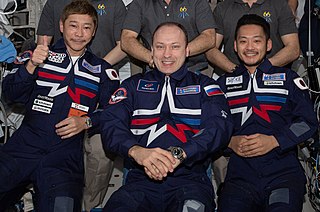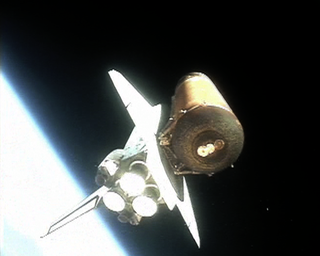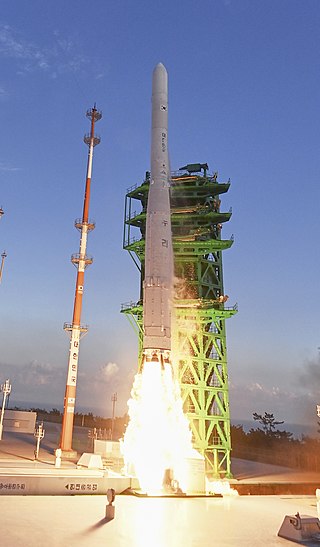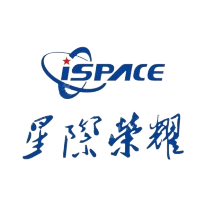
Space tourism is human space travel for recreational purposes. There are several different types of space tourism, including orbital, suborbital and lunar space tourism. Tourists are motivated by the possibility of viewing Earth from space, feeling weightlessness, experiencing extremely high speed and something unusual, and contributing to science.

An orbital spaceflight is a spaceflight in which a spacecraft is placed on a trajectory where it could remain in space for at least one orbit. To do this around the Earth, it must be on a free trajectory which has an altitude at perigee around 80 kilometers (50 mi); this is the boundary of space as defined by NASA, the US Air Force and the FAA. To remain in orbit at this altitude requires an orbital speed of ~7.8 km/s. Orbital speed is slower for higher orbits, but attaining them requires greater delta-v. The Fédération Aéronautique Internationale has established the Kármán line at an altitude of 100 km (62 mi) as a working definition for the boundary between aeronautics and astronautics. This is used because at an altitude of about 100 km (62 mi), as Theodore von Kármán calculated, a vehicle would have to travel faster than orbital velocity to derive sufficient aerodynamic lift from the atmosphere to support itself.

The Korea Aerospace Research Institute, established in 1989, is the aeronautics and space agency of South Korea. Its main laboratories are located in Daejeon, in the Daedeok Science Town. KARI's vision is to continue building upon indigenous launch capabilities, strengthen national safety and public service, industrialize satellite information and applications technology, explore the Moon, and develop environmentally-friendly and highly-efficient cutting-edge aircraft and core aerospace technology. Current projects include the KSLV-2 launcher. Past projects include the 1999 Arirang-1 satellite. The agency was founded in 1989. Prior to South Korea's entry into the Institute for Advanced Engineering (IAE) in 1992, it focused primarily on aerospace technology.
UP Aerospace, Inc. is a private spaceflight corporation headquartered in Denver, Colorado. UP Aerospace provides sub-orbital transportation for corporate, military and educational payloads, via their SpaceLoft XL sounding rocket launch vehicles.

This comparison of orbital launch systems lists the attributes of all individual rocket configurations designed to reach orbit. A first list contains rockets that are operational or in development as of 2023; a second list includes all upcoming rockets and a third list includes all retired rockets. For the simple list of all conventional launcher families, see: Comparison of orbital launchers families. For the list of predominantly solid-fueled orbital launch systems, see: Comparison of solid-fueled orbital launch systems.

Nuri, also known as KSLV-II, is a three-stage launch vehicle, the second one developed by South Korea and the successor to Naro-1 (KSLV-1). Nuri is developed by Korea Aerospace Research Institute (KARI). All three stages use indigenously developed launch vehicle engines, making Nuri the first indigenously developed South Korean orbital launch vehicle.

Astra Space, Inc. is an American launch vehicle company based in Alameda, California. Astra was incorporated in October 2016 by Chris Kemp and Adam London. Formerly known in media as "Stealth Space Company", the company formally came out as Astra Space, Inc. in a Bloomberg L.P. article by Ashlee Vance. Investors include BlackRock, Advance, ACME, Airbus Ventures, Innovation Endeavors, Salesforce co-founder Marc Benioff, former Disney CEO Michael Eisner, and more.

A small-lift launch vehicle is a rocket orbital launch vehicle that is capable of lifting 2,000 kg (4,400 lb) or less or under 5,000 kilograms (11,000 lb) of payload into low Earth orbit (LEO). The next larger category consists of medium-lift launch vehicles.

Gilmour Space Technologies is a venture-funded Australian aerospace company that is developing hybrid-propellant rocket engines and associated technologies to support the deployment of a low-cost launch vehicle.
Interstellar Technologies, Inc., or IST, is a Japanese private spaceflight company aiming to eventually build a launch vehicle for smallsats under 100 kg. It is a rocket spacelaunch company developing the MOMO suborbital rocket and the ZERO orbital launch vehicle. Interstellar's stated goal is to reduce the cost of access to space.
LinkSpace or Link Space Aerospace Technology Inc. is a Chinese private space launch company based in Beijing. It is led by CEO Hu Zhenyu, and founded as the first private rocket firm in China. The company was founded in 2014, by Hu Zhenyu, a graduate of South China University of Technology; Yan Chengyi, a graduate of Tsinghua University; and Wu Xiaofei, a manufacturing expert. The company is registered in Shenzhen.

The year 2023 saw rapid growth and significant technical achievements in spaceflight. For the third year in a row, new world records were set for both orbital launch attempts (223) and successful orbital launches (211). The growth in orbital launch cadence can in large part be attributed to SpaceX, as they increased their number of launches from 61 in 2022 to 98 in 2023. The deployment of the Starlink satellite megaconstellation was a major contributing factor to this increase over previous years. This year also featured numerous maiden launches of new launch vehicles. In particular, SSLV, Qaem 100, Tianlong-2, Chollima-1, and Zhuque-2 performed their first successful orbital launch, while SpaceX's Starship – the world's largest rocket – launched two times during its development stage: IFT-1 and IFT-2.
OneSpace or One Space Technology Group is a Chinese private space launch group based in Beijing, subsidiaries in Chongqing, Shenzhen and Xi'an. OneSpace was founded in 2015. OneSpace is led by CEO Shu Chang, and is targeting the small launcher market for microsatellites and nanosatellites. OneSpace launched China's first private rocket in 2018.

i-Space —also known as Space Honor, Beijing Interstellar Glory Space Technology Ltd., Interstellar Glory or StarCraft Glory—is a Chinese private space technology development and space launch company based in Beijing, founded in October 2016.
Whalers Way Orbital Launch Complex is a proposed rocket-launching facility operated by Southern Launch at Whalers Way, in the locality of Sleaford near Port Lincoln on South Australia's Eyre Peninsula.
Southern Launch is the trading name of SouthernLaunch.space Pty Ltd, an Australian rocket launch and range service provider company that as of 2023 operated Australia's only rocket launch ranges approved by the Australian Space Agency for launches to space.

AgniKul Cosmos Private Limited is an Indian aerospace manufacturer based in National Center for Combustion R&D (NCRD) of IIT Madras, Chennai. The start up aims to develop and launch its own small-lift launch vehicle such as the Agnibaan, capable of placing 100 kg (220 lb) payload into a 700 km (430 mi) orbit. The first commercial launch was expected in 2022. However, no launch happened in that year. The first suborbital mission will be conducted on 22 March 2024.

ABL Space Systems is an American aerospace and launch service provider, based in El Segundo, California, that manufactures deployable launch vehicles and infrastructure for sending commercial small satellites into orbit. The company manufactures its components in the United States.
The Vikram is a family of small-lift launch vehicles being developed by Skyroot Aerospace, an Indian startup aerospace company.












